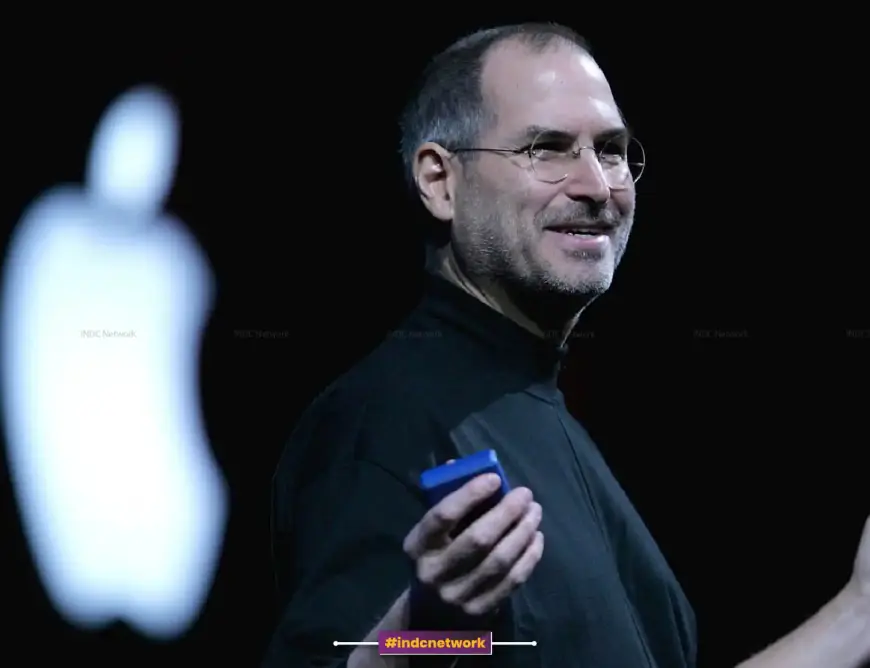The Visionary Rebel Who Revolutionized Technology: Unveiling Steve Jobs’ Apple Legacy
Steve Jobs, the co-founder of Apple, was a visionary rebel who transformed technology, design, and innovation. From the company’s inception in a garage to becoming a global tech empire, Jobs’ relentless pursuit of perfection reshaped industries and enriched lives. This article explores his journey, Apple’s groundbreaking products, and the enduring impact of Jobs’ unique leadership style.

indc Network : Biography : Steve Jobs: The Visionary Rebel Behind Apple’s Legacy
When we hear the name "Apple," sleek devices, groundbreaking innovation, and industry-defining technology spring to mind. At the heart of this global phenomenon stands one man: Steve Jobs. A visionary with relentless ambition, Jobs redefined the concept of personal computing, revolutionized consumer technology, and forever changed the world of design. His story is one of grit, imagination, and a refusal to settle for anything less than extraordinary.
Humble Beginnings in a Garage
Steve Jobs was born on February 24, 1955, in San Francisco, California. Adopted by Paul and Clara Jobs, Steve grew up in Mountain View, California, which would later become the heart of Silicon Valley. From an early age, Jobs displayed a fascination with electronics and design.
In 1976, Jobs, along with his friend Steve Wozniak and Ronald Wayne, founded Apple Computer Inc. in Jobs' family garage. The trio’s first product, the Apple I, was a rudimentary computer board. Unlike anything on the market, the Apple I marked the beginning of a revolution.
The Apple II, launched in 1977, solidified Apple’s position as a major player in the tech world. With its user-friendly interface and elegant design, it became one of the first successful mass-market personal computers.
The Rise, Fall, and Return of Jobs
By the early 1980s, Apple was a rapidly growing company. However, the introduction of the Macintosh in 1984, while groundbreaking, faced mixed reviews due to its high price and limited software. Tensions within Apple’s leadership reached a breaking point in 1985, and Jobs was forced out of the company he helped create.
Jobs' departure from Apple could have been the end of his story, but it marked a new chapter of innovation. He founded NeXT, a company specializing in high-end workstations for the education and business markets. NeXT’s technology later became foundational to Apple’s operating systems.
Simultaneously, Jobs purchased Pixar from George Lucas for $10 million. Under his leadership, Pixar transformed into a leader in animation, producing hits like Toy Story and Finding Nemo.
Jobs’ triumphant return to Apple in 1997 came at a time when the company was struggling. His comeback would not only save Apple but also reinvent it as the most innovative company in the world.
Revolutionary Products That Changed the World
Under Jobs’ leadership, Apple introduced products that redefined industries:
- iMac (1998): With its all-in-one design and vibrant colors, the iMac revitalized Apple’s image and financial stability.
- iPod (2001): A compact music player that revolutionized how people listen to music, paving the way for the digital music era.
- iTunes Store (2003): This platform reshaped the music industry, offering a convenient way to purchase and organize music legally.
- iPhone (2007): The device that redefined smartphones and introduced the concept of an all-in-one pocket computer.
- App Store (2008): A marketplace for mobile applications that fostered an ecosystem of innovation and entrepreneurship.
- iPad (2010): A new category of device that blended the functionality of a smartphone and a laptop.
Jobs’ insistence on intuitive design, seamless user experience, and perfection turned these products into cultural phenomena.
The Philosophy of Steve Jobs
Steve Jobs wasn’t just a CEO; he was a storyteller, a marketer, and an artist. His philosophy was rooted in the intersection of technology and the liberal arts, where creativity met engineering.
- Simplicity: Jobs believed in eliminating the unnecessary. “Simple can be harder than complex,” he famously said. This principle was evident in Apple’s minimalist designs.
- Perfectionism: Jobs’ relentless attention to detail was legendary. Whether it was the font on a screen or the feel of a device in hand, he demanded the best.
- Thinking Different: The slogan “Think Different” wasn’t just a marketing campaign; it encapsulated Jobs’ approach to life and business. He challenged norms and dared to innovate.
Leadership and Controversy
Jobs was a polarizing figure. His leadership style, often described as demanding and abrasive, alienated some colleagues but inspired others. He pushed teams to achieve the impossible, fostering a culture of excellence at Apple.
Critics argue that his perfectionism sometimes bordered on obsession and that his management style was too harsh. However, his ability to envision what others couldn’t and execute flawlessly earned him unwavering loyalty and admiration.
Legacy and Impact
Steve Jobs passed away on October 5, 2011, at the age of 56, after a long battle with pancreatic cancer. His death marked the end of an era, but his legacy lives on.
Apple continues to be a dominant force in the tech industry, driven by the foundation Jobs built. Beyond Apple, his influence extends to the way we interact with technology, consume media, and even how products are designed across industries.
Jobs inspired countless entrepreneurs to dream big and think differently. His story is a testament to the power of vision, determination, and the courage to follow one's intuition.









